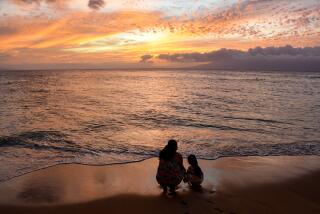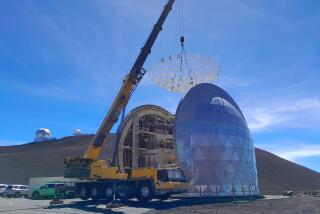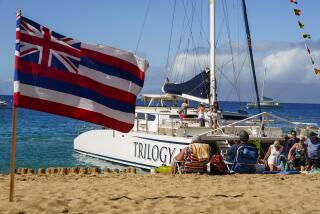Hawaii Island’s otherworldly Nahaku-Thurston Lava Tube reopens after quake repairs
- Share via
Almost two years after earthquakes and volcanic eruptions forced the closure of Hawaii Volcanoes National Park on Hawaii Island, one of its most unusual attractions has reopened.
Nahuku-Thurston Lava Tube, reopened to visitors on Thursday, nearly 22 months after it and the rest of the park were evacuated in 2018 after several strong earthquakes shook Hawaii Island, sending lava to the surface that flowed over roads and destroyed neighborhoods.
The tube, discovered more than a century ago, is essentially a cave that was created as massive amounts of molten rock reshaped the subterranean landscape. It is tall enough for adults to walk through. The trek along the access trail, through ferns and into the tube, takes about 20 minutes and covers about one-half mile.
Parts of the park began to reopen Sept. 22, 2018, but the tube remained closed for safety reasons. The seismic and volcanic activity dislodged several large rocks from the cave’s ceiling, and rangers also discovered new cracks in the hardened lava.
A geology expert, a mining engineer and other specialists determined the lava tube could reopen after being stabilized. Lighting repairs and work to drain water from the walkway also were completed.
A new, low-hanging outcropping of rock is marked to keep people from hitting their heads.
Roots of the ohia trees above the cave have grown down through the ceiling. Rangers warn visitors not to touch them because the trees are fragile.
The lava tube is open 24 hours a day, but illuminated only from 8 a.m. to 8 p.m. Visitors seeking an otherworldly experience during the non-illuminated hours must bring flashlights, extra batteries and, ideally, headlamps. Such accessories are a good idea during the daytime too.
To avoid crowds, park officials urge visitors to arrive before 9 a.m. or after 4 p.m.
The cave’s small parking lot has been rebuilt but contains just 18 stalls. That includes two handicap-accessible spaces and two for tour company vans. Parking is limited to 30 minutes.
Additional parking is available at the Kilauea Iki Overlook, one-half mile away.
The park’s “recovery” page website details which sites are now open and which remain closed. It also includes a map.
Among the places still off-limits is Crater Rim Drive from Kilauea Military Camp to Kilauea Overlook. Huge cracks opened in the road, parts of which collapsed into Kilauea Volcano’s greatly enlarged caldera.
Also still closed, most likely forever, is the park’s popular Jaggar Museum, which sits on a ledge and is, according to a Sept. 5, 2018, news release, “extremely unstable.”
The lava tube is named for Lorrin Thurston, a local newspaper publisher who discovered the cave in 1913. Thurston was also an advocate for the creation of the national park. A quarter-century earlier, he was one of the leading voices advocating the overthrow of Hawaii’s monarchy. Queen Liliuokalani was forced to abdicate her throne.
More to Read
Sign up for The Wild
We’ll help you find the best places to hike, bike and run, as well as the perfect silent spots for meditation and yoga.
You may occasionally receive promotional content from the Los Angeles Times.






